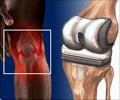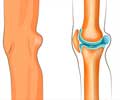A new study published on >bmj.com says that peoples' access across England to total joint replacement of the hip or knee is uneven and affected unfairly by age

Total joint replacement of the hip or knee is a common procedure, which is cost effective and boosts public health. There were 82,419 knee operations in 2008-09 in England and 77,608 hip operations.
Fairness in access to healthcare is a founding principle of the health service and local primary care trusts (PCTs) are required to conduct Health Equity Audits.
Researchers from the UK and Canada set out to explore the geographical and socio-demographic factors linked to variation in equity of access to these operations.
They used data from the Somerset and Avon Survey of Health (a small-area population based survey), the English Hospital Episode Statistics (HES) database and the English Longitudinal Study of Aging (ELSA) – a nationally representative population based survey of 11,329 people aged 50 and over living in private households in England.
The Somerset survey and ELSA data gathered between March 2002 and March 2003, allowed the researchers to work out predicted rates of need of total knee or hip replacement amongst the population.
Advertisement
They combined the different sources of routine data into a single model and found there was clear evidence of under-provision of hip and knee replacement relative to need.
Advertisement
Men received 31% more knee replacements relative to need than women and 8% more for hip replacements.
People living in deprived areas were found to receive around 70% less provision relative to need compared with the most affluent areas for both knee and hip replacements.
Those living in urban areas got greater provision of knee replacement relative to need than people living in more isolated places, but the effect was different for hip replacement with people in villages or isolated areas getting the most provision relative to need.
These results are illustrated in two maps in the full paper (see link below).
The ethnic mix of an area made no difference for hip replacements, but people living in non-white areas were more likely to receive a knee replacement than people residing in mostly white areas.
The authors conclude: "Policy makers should examine factors at the patient or primary care level to understand the determinants of inequitable provision."
Although this study provides a major methodological advance, the implications of its findings for current policy are limited because the data are from 2002, say Professors Ann Bowling and Martin McKee, in an accompanying editorial.
Investment in the NHS has increased since then. Hence the considerable under-provision recorded here is likely to have been alleviated to some extent, they write, although they cannot be sure of this.
They believe that further analyses using both NHS and private sector data are needed to know whether the health needs of the population are being met and ask why any inequalities exist and how they can be tackled.
Now that the Department of Health in England has signified its intent to move to general practice commissioning, they ask who, if anyone, will have the skills or interest to take on this important role?
Source-Eurekalert










